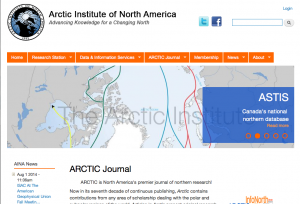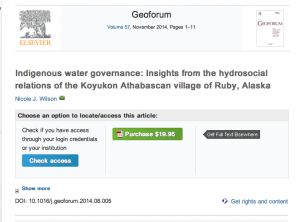Wilson, N.J., Walter, M.T., Waterhouse, J., 2015. Indigenous Knowledge of Hydrologic Change in the Yukon River Basin: A Case Study of Ruby, Alaska. ARCTIC 68, 93–106. doi:10.14430/arctic4459
Abstract: In the Arctic and Subarctic, the contribution of Indigenous knowledge to understanding environmental change has been established over the last several decades. This paper explores the role of Indigenous knowledge of water in understanding hydrologic change within complex social-ecological systems. Semi-structured interviews with community experts from Ruby Village, Alaska contribute Indigenous observations of hydrology in the Yukon River Basin. These observations are combined with findings from scientific literature to illustrate the commonalities and differences. Research findings reveal the contribution of Indigenous knowledge to understandings of hydrologic change in the Yukon River and its tributaries including insights regarding alterations in sediment and river ice regimes. Recommendations for future research that incorporates Indigenous knowledge of water include multiple geographically distributed case studies in order to gain insight into hydrologic changes in the watershed. Key findings in this study include 1) using participatory research approaches to ensure that research benefits the communities whose livelihoods are impacted by hydrologic changes, and 2) initiating a multidisciplinary approach that combines qualitative and quantitative methods from the social and biophysical sciences, in order to more effectively understand and respond to hydrologic changes.
Keywords: Climate Change; Indigenous Knowledge of Water; Socio-hydrology; River Dynamics; Water Resources.
Wilson, N.J., (2014). Indigenous water governance: Insights from the hydrosocial relations of the Koyukon Athabascan village of Ruby, Alaska. Geoforum 57, 1–11. doi:10.1016/j.geoforum.2014.08.005
Abstract: Water is fundamental to Indigenous ways of life. Specific Indigenous peoples maintain distinct and multifaceted sociocultural relations to water, yet the legacy of colonialism globally means that communities around the world face similar challenges to protecting these relations. The role of Indigenous peoples and their sociocultural relations to water is currently under acknowledged in the water governance literature. Through a case study of the Koyukon Athabascan people of Ruby, Alaska, this article examines how the explicit analysis of hydrosocial relations facilitates conceptualization of Indigenous water governance. Participatory research methods involving semistructured interviews and traditional use mapping were employed to document the hydrosocial relations of the people of Ruby, which water law and policy in Alaska does not adequately recognize. This study contributes to the literature in two ways. First, an engagement with the hydrosocial literature makes explicit the distinct sociocultural relations to water maintained by all human communities and the existence of these multiple normative orders within the same political space, where the hydrosocial relations of some populations are privileged over others. Second, it contributes to the conceptualization of Indigenous water governance by exploring the extent to which Indigenous peoples in the Yukon River Basin, including the people of Ruby, are engaging in multiple strategies to assert their sovereignty. These strategies include recognition-based approaches such as litigation to gain legal recognition of Indigenous water rights and Indigenous alternatives without reference to state recognition such as the development of community-based water monitoring programs.
Keywords: Water governance; Hydrosocial relations; Water values; Indigenous people; Indigenous governance; Alaska

